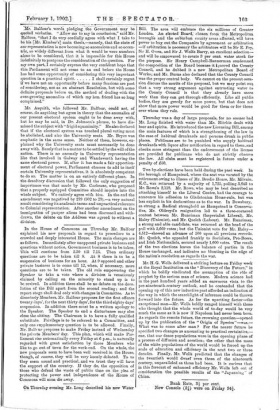In the House of Commons on Thursday Mr. Balfour explained
his new proposals in regard to procedure to a crowded and deeply interested House. The main changes are as follows. Immediately after unopposed private business and questions without notice, Government business is to be taken, This will continue from 2.30 till 7.15. Then ordinary qUestions are to be taken till 8. At 8 there is to be a suspension of business for an hour. At 9 opposed and other private business is to come till 12, when, if necessary, more questions are to be taken. The old role empowering the Speaker to take a vote where a division is vexatiously claimed by calling on the minority to stand up is to be revived. In addition there shall be no debate on the devo- lution of the Bill apart, from the second reading; and the report stage shall deal only with changes in Committee. As to disorderly Members, Mr. Balfour proposes for the first offence twenty days', for the next thirty days', for the third eighty days' suspension. In addition there must be a written apology to the Speaker. The Speaker to end a disturbance may also arise the sitting. The Chairman is to have a fully qualified substitute. Privilege is to be referred to a Committee, and only one supplementary question is to be allowed. Finally, Mr. Balfcur proposes to make Friday instead of Wednesday the private Members' day. This plan, which will make Par- liament rise automatically every Friday at 6 p.m., is naturally regarded with great satisfaction by those Members who like to go out of town for the week-end. On the whole, the new proposals seem to have been well received in the House, thOugb, of course, they will be very keenly debated. To us they seem sound and practical, and we Arad they will have the support of the country. If they do, the opposition of those who defend the waste of public time on the plea of pretesting the power and independence of the House of Commons will soon die away.






































 Previous page
Previous page